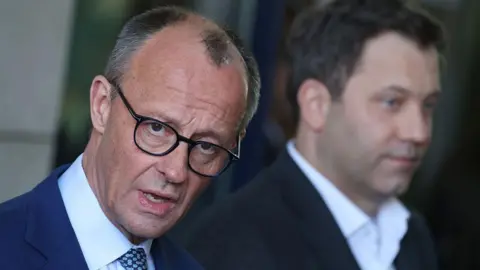Germany is back, says Merz, after sealing government deal
 Getty Images
Getty ImagesGermany's conservatives under Friedrich Merz have reached a deal with the Social Democrats to govern Europe's biggest economy, five months after the previous government collapsed.
Merz, 69, said their agreement sent "a strong and clear signal" to Germans and the EU that they would get "a strong government capable of action".
Germany was already in recession before it was buffeted by economic turbulence, caused by US President Donald Trump's trade tariffs.
"The key message to Donald Trump is Germany is back on track," said the chancellor-in-waiting, promising to fulfil defence commitments and revive economic competitiveness.
Merz and his coalition partners have been under intense pressure to put an end to Germany's political limbo since his Christian Democrats won federal elections in February.
He has also just seen his party overtaken in an opinion poll by the far-right, anti-immigration Alternative for Germany (AfD).
Announcing the government deal, Merz promised to reform and stabilise Germany, with a focus on migration, the economy and defence.
"Europe can rely on Germany," he said, promising "a strong plan to bring our country to the forefront again".
He will have to wait for the week starting 5 May for the new parliament to elect him as chancellor, but should have no problem with a 13-seat majority.
The coalition parties had already signalled their urgency last month, when they pushed through significant reform of Germany's strict debt rules.
Such changes mean the new government will be able to plough significant investment into the military and the country's crumbling infrastructure.
Included in Wednesday's agreement were a series of measures to "control and largely end irregular migration", and impose border controls aimed at addressing one of the big concerns of voters in the February election.
The AfD complained that the plans did not go far enough, accusing Merz of capitulating to the Social Democrats.
In a recent report to parliament, Germany's armed forces commissioner highlighted dramatic shortages in the military across the board, from ammunition and soldier numbers to dilapidated barracks.
Another significant part of the coalition deal is for defence spending to be increased, and for boosting the strength of the military.
Although there will be no conscription, Merz said the coalition was aiming to follow a "Swedish model" of voluntary military service.
"We hope that with enough volunteers, we will also be able to achieve an expansion of the Bundeswehr [German armed forces]," he said.
Merz also promised "comprehensive support" to Ukraine.
- Germany leads defiance of Trump car tariffs, saying it "will not give in"
- Germany decides to leave history behind and prepare for war
- Merz clinches package to revamp defence and infrastructure
Although his government will feature almost entirely new names - Merz himself has never been a cabinet minister - there will be continuity at the defence ministry.
Boris Pistorius, the Social Democrat defence minister in the outgoing government, is expected to remain in post.
This will be the fifth so-called grand coalition (GroKo) - involving the big parties of the centre right and centre left since World War Two - but the parties were at pains to say it would not be like any previous government.
With Germany in economic recession, though, one leading politician on the populist left, Sahra Wagenknecht, said they offered no answer either to Germany's economic crisis or the trade war.
She said Germany was threatened with a third and fourth year in recession, which she dubbed "Merzession".
Merz said he was confident that the coalition deal would be approved by their respective parties and they would be able to get to work in early May.
Meanwhile, an Ipsos poll on Wednesday put Merz's conservatives in second place on 24% support, a point behind Alternative for Germany (AfD), whose co-leader Alice Weidel hailed the survey as unprecedented, and promised that "political change will come".
